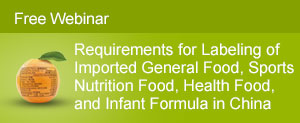According to the information published by China customs’ website and compiled by CIRS’s food regulatory team, more than 140 tons of imported biscuits have been rejected by China Customs between March 2012 and February 2014 (please refer to the table at the end of this article). The majority of those biscuits were imported from Taiwan, Malaysia, Poland, New Zealand, Indonesia, Philippines, Italy, Japan and USA.
The most important reason why these biscuits were rejected by China is that they failed to meet the requirements of China’s food safety regulations. Three aspects should be taken into consideration when it comes to compliance with China’s food regulations.
Firstly, the formula of your prepackaged foods should meet the requirements of GB 2760-2011 Food Safety National Standards for the Usage of Food Additives and GB 14880-2012 Food Safety National Standards for the Usage of Nutrition Enrichment. In January 2014, 5.38 tons of biscuits produced by PT. DUA KELINCI were returned by China Customs because the manufacturer has used E155 inappropriately. Meanwhile, 112 batches of imported biscuits have been rejected because of incompliant formula in the past two years.
Secondly, the prepackaged foods should be in a good quality to meet quality standards for specific type of foods. For biscuits, there are two standards which apply, namely: GB 7100-2003 Hygienic standard for biscuits and GB 20980-2007 Food safety national standards for biscuit. In January 2014, 4.2 tons of biscuits produced by SUBUR INSPIRASI SDN BHD were returned by China Customs because of excess colony counts. Meanwhile, 184 batches of imported biscuits have been rejected due to disqualified microbiological index in biscuits in the past two years.
Finally, the Chinese label of pre-packaged foods should be prepared in accordance with and GB 28050- 2011 Food safety national standards - general standards for the nutrition labeling of prepackaged foods. The Chinese label of imported prepackaged foods is strictly checked by inspectors from Chinese Exit-Entry Inspection and Quarantine Bureau (CIQ). Even a punctuation error may lead to re-labeling and delayed customs clearance, which means extra costs. In addition to that, the labeling of food additives, reasonable indicators of nutrition contents, legal AD wording and formal layout will also be examined during Customs clearance. To the best of our knowledge, approximately 20% of rejections are caused by incompliant Chinese label.
Highlights of Rejection Reasons for Imported Biscuits
1. Unapproved food additives
2. Unapproved nutrition enhancers
3. Incompliant food label
4. Exceed shelf-life, leak of certificates and imported from infected area.
2. Unapproved nutrition enhancers
3. Incompliant food label
4. Exceed shelf-life, leak of certificates and imported from infected area.
Regulations and China Food Safety National Standards for Biscuits
1. GB 2760-2011 Food safety national standards for uses of food additives
2. GB 14880-2012 Food safety national standards for the use of enhancer
3. GB 7718-2011 Food safety national standards - general standards for the labeling of prepackaged foods
4. GB 28050- 2011 Food safety national standards - general standards for the nutrition labeling of prepackaged foods
5. GB 7100-2003 Hygienic standard for biscuits
6. GB 20980-2007 Food safety national standards for biscuit
2. GB 14880-2012 Food safety national standards for the use of enhancer
3. GB 7718-2011 Food safety national standards - general standards for the labeling of prepackaged foods
4. GB 28050- 2011 Food safety national standards - general standards for the nutrition labeling of prepackaged foods
5. GB 7100-2003 Hygienic standard for biscuits
6. GB 20980-2007 Food safety national standards for biscuit
CIRS suggestion
If you would like to export biscuit products to China, the following 3 steps should be taken to ensure regulatory compliance.
1. Ensure the raw materials, food additives and nutrition enhancers are all allowed to be used in the biscuit in accordance with Chinese regulations and national standards;
2. Guarantee the quality of your prepackaged food products;
Organic inspection, physical and chemical indexes and microbiological index should meet the requirements of relevant national standards. It is especially important to prevent metal ion pollution and microbial contamination from raw materials and food contact equipments in the whole manufacturing process. Meanwhile, pre-testing in qualified laboratories in China will be quite useful for checking if a product has met quality and safety standards in China. Tests may vary depending on the labs and methods used. You may consider testing in China even if you have done your own testing.
3. Check if the packaging and label are compliant with relevant national standards.
Statistics on Rejections of Imported Biscuits 2012-2014 – Compiled by CIRS
| Time | Weight (tons) | Batches |
| Mar 2012 | 0.016 | 30 |
| Apr 2012 | 0.005 | 14 |
| May 2012 | 0.004 | 25 |
| Jun 2012 | 0.002 | 9 |
| Jul 2012 | 0.002 | 22 |
| Aug 2012 | 0.009 | 25 |
| Sep 2012 | 0.004 | 12 |
| Oct 2012 | 5.380 | 9 |
| Nov 2012 | 0.913 | 9 |
| Dec 2012 | 21.200 | 20 |
| Jan 2013 | 9.839 | 18 |
| Feb 2013 | 4.579 | 10 |
| Mar 2013 | 1.855 | 10 |
| Apr 2013 | 19.901 | 16 |
| May. 2013 | 1.263 | 4 |
| Jun. 2013 | 3.016 | 6 |
| Jul. 2013 | 18.390 | 19 |
| Aug 2013 | 1.216 | 11 |
| Sep 2013 | 10.030 | 14 |
| Oct 2013 | 8.091 | 9 |
| Nov 2013 | 2.923 | 4 |
| Dec 2013 | 8.576 | 17 |
| Jan 2014 | 22.611 | 51 |
| Feb 2014 | 0.382 | 16 |
| Total | 140.207 | 380 |
Download
GB 7100-2003 Food Safety National Standards for Hygienic Standard for Biscuits (CN version free download)
Contact
Ms. Cathy Yu, Senior Consultant, Food Safety Regulation, CIRS China
11F Dongguan Building, 288 Qiuyi Road, Binjiang District, Hangzhou, China, 310020
Tel : +86 571 8720 6538 | Fax : +86 571 8720 6533
Email: cathy.yu@cirs-group.com
11F Dongguan Building, 288 Qiuyi Road, Binjiang District, Hangzhou, China, 310020
Tel : +86 571 8720 6538 | Fax : +86 571 8720 6533
Email: cathy.yu@cirs-group.com






